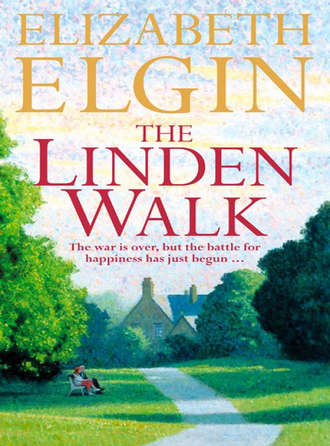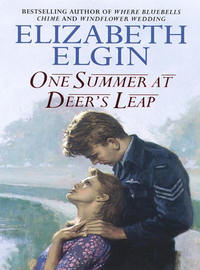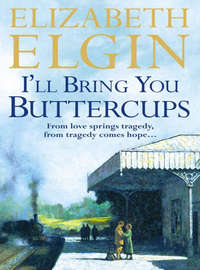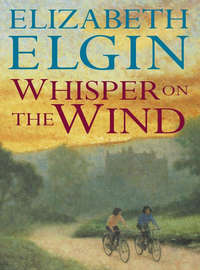
Полная версия
The Linden Walk
‘Then close your eyes. I’ll tuck your rug around you.’
But Agnes Clitherow did not hear. Already she was asleep, breathing softly, a small smile on her lips.
‘I’ll make Drew happy, I promise.’ Gently, Lyn kissed her cheek then quietly closed the door behind her. ‘But oh, Kitty Sutton from Kentucky, you are going to be such a hard act to follow …’
For just a moment, doubt took her and she wondered how she would cope, and if she had been wise to say yes to Drew. Because the man she had loved since first she laid eyes on him already had two other loves to lay claim to him – Kitty and Rowangarth, and if Lyndis Carmichael was to have any chance of happiness she, too, must learn to love them both. They were a part of Drew and nothing could, or would change it.
Her eyes, as she walked slowly up the stairs, met those in the portrait of a long-ago Sutton – the one, was it, who fought at Balaclava? He wore a splendid red jacket, braided with gold, and was not one bit like the sailor whose cap she retrieved when Daisy, in her excitement, had thrown herself into his arms and sent that cap rolling along the pavement in wartime Liverpool.
She stood for a while, head high, eyes accepting the challenge.
‘I will make him happy, I damn well will!’
A light shone from the kitchen window at the Bothy and Julia opened the front door and called, ‘You there, Polly?’
‘I am, Mrs Sutton,’ Keth’s mother, Polly Purvis, smiled, from the top of the stairs. ‘I’ve been having a good look round. Upstairs is ready for the carpets and curtains, now.’
‘Y’know, Polly, I never thought I’d say this, but thank heaven for Pendenys Place and all those carpets and curtains going to spare.’
‘And thank heaven the dratted moths didn’t get at them. Six years in storage is a long time.’
‘There isn’t the moth flying,’ Julia grinned, ‘that would dare eat Aunt Clemmy’s carpets.’
Only the very best for Clementina Sutton’s father who had built Pendenys Place for his only child as a wedding dowry, then furnished it with ostentatious bad taste.
‘Curtains came back from the cleaners yesterday. I hung them on the line outside to sweeten. Will Stubbs said he’d make a start on getting the curtain poles put back if someone will tell him what height they’re to go. I’ll see to it, if you like.’
‘You’re a treasure, Polly. I’m glad you are coming to work for Nathan and me and you’ll know that as a Sutton employee you won’t have to pay rent on your almshouse any longer. Starting October first, I think it should be.’
‘Why, thank you I’m sure.’ She flushed with pleasure to think of five shillings a week saved.
‘And see Tom if you want the odd rabbit or two, don’t forget. Rowangarth perks, Polly.’
‘Then I’ve got to be honest and admit that he slips me a rabbit every week.’
‘Well, he would,’ Julia laughed, ‘your son being married to his daughter. But it’s official, now. And a load of logs at Christmas.’
‘I’m obliged, Mrs Sutton.’
Life, Polly Purvis thought, seemed only to get better with each year that passed. Rowangarth had been good to her after what had happened in Hampshire and a far cry away from the night she accepted she was a widow, with a child to rear and only ten shillings a week to manage on. Rowangarth – and the Suttons – had given her more than she ever dare hope for. Now, she was contented with a son who had married his childhood sweetheart, Daisy – aye, and given her a granddaughter, too. If only she could go back, just the once, to the little house called Willow End they once lived in, and on to the village and the churchyard, where Dickon lay.
But Hampshire was a long way away, and sentimental journeys cost money, so she had contented herself with the photograph of the grave that Keth and Daisy took when they honeymooned in Winchester. Dickon was resting sweetly and out of his pain and shame, Polly brooded, and if there was a heaven then he would know how often she thought about him and missed him, still.
‘I’m going to miss Rowangarth.’ Julia’s voice called Polly back from her rememberings. ‘Was born there, lived all my life there, too. But Nathan and I will be very snug here, and it’s only right and proper that Drew takes over Rowangarth. After all, it belongs to him. Come to think of it, it’s been his since he was two hours old.’
‘Then if the Fates allow, his children will be born there, too. And here’s Polly Purvis coming to work for you and the Reverend when you move into this Bothy. It’ll be like coming home to me. All those years I was cook here in the war, and looking after those land girls who lived in it. Happy days. You and me, Mrs Sutton, are two very lucky ladies, all things considered.’
And Julia Sutton smiled and agreed that they were. Very lucky ladies.
FIVE
A new car, Keth Purvis was bound to admit as he drove to school, was something most men wanted; the more so since manufacturers were at last being allowed to make them again. No more military vehicles. Cars for private use was now a tantalizing pipe dream, the new models being flaunted to the skies, then immediately exported to help the economy drive. Even if the garage in Creesby did manage to get a few to sell to the public, Keth frowned, there would be a waiting list for them a mile long. And what was he bothering about, anyway? He couldn’t afford one – simple as that.
Yet his wife could. Daisy had money, a fact few people were aware of. Not even Lyn knew. All those years she and Daisy had been together as Wrens and knowing the way women chattered, it still amazed him that his wife had been so tight-lipped about her fortune.
They had talked about new cars that morning – or rather, Daisy had. Sitting on the edge of the bath as he shaved, actually.
‘We’ve got to talk, Keth. Seriously,’ she had said. ‘About cars. You know there’s going to be a motor show in London?’
‘Yes. The first since 1939,’ he had said, casually as he could, staring into the mirror. ‘Was talking to Drew about it. I think he’d like to go. Said there’d be some new models on show.’
It had been a mistake, mentioning new cars.
‘So why don’t you go with him, and get one?’
‘Darling girl. New cars are for export. There won’t be any released for the home market.’
‘It said in the paper there’ll be some, and I’m sick of you driving that old boneshaker. It isn’t safe. It needs new tyres, for a start.’
‘But no one can get new tyres. They’re like gold dust.’
‘So get a new car, then. I want you to have one.’
‘Daisy Purvis.’ He kissed the tip of her nose which was tilted dangerously high to match the set of her mouth, and such signs were best not ignored. ‘Look – can we talk about it tonight? Don’t want to be late for school.’
‘I want you to have a car,’ she had repeated, tight-lipped. ‘A new one. And okay, we’ll talk about it tonight, but if you say one word about the money there’ll be ructions.’
The money. Daisy’s money. A small fortune.
‘Tonight,’ he had said. ‘Promise …’
His foot touched the brake. The road ahead was full of children. Watch out for the little blighters, Keth. They could dart in front of you with never a glance to the left or right. Children of all ages who called him Sir and to whom he taught mathematics.
He slowed almost to a crawl, thinking about his own child. A month old and already a dark-eyed, dark-haired beauty who smiled often, now. Mary, more precious than any new motor.
Carefully he parked in his allotted space. The old car had a few more miles left in it yet – but how to convince Daisy? Deliberately he pushed the problem from his mind and thought instead how lucky – how damned lucky – he had been to survive the war, and all at once cars didn’t seem important.
Not until tonight when he got home that was, when it would all start again.
‘I’ll be making bramble jelly today.’ Alice Dwerry-house poured her husband’s ten o’clock drinkings into the large cup that had once been Reuben’s.
‘Came by some crafty sugar, did you?’
‘Indeed I did not!’ Even now, she was apprehensive about black market dealings. ‘It’s the sugar the government allowed for jam-making in the summer.’
Allowed, she thought peevishly. Sugar should have been taken off the ration by now, and butter and lard and bacon. And good red meat!
‘Very nice.’ Tom was partial to bramble jelly. ‘You’ll be over to Foxgloves with a jar for Daisy this afternoon?’
‘No. I’m going to Creesby to look at material. I’ve got eight clothing coupons put by, and I want to make myself something nice for Drew’s wedding.’
‘But lass, it’s months away! Next summer!’
‘I know it, but I don’t want to be all last-minute rush. I might have to look around quite a bit before I find something that goes with my best hat.’
The Best Hat. A magnificent creation and very expensive. The one she had worn to Daisy’s wedding and would be brought out many more times if Alice was to get her value out of it.
‘Aye. The hat.’ Alice had looked a treat in it. ‘I suppose Polly will be wearing her wedding hat, an’ all – if she’s asked.’
‘Of course she’ll be asked. Oh, Tom, I’m so looking forward to it. Can’t wait to see my lad married.’
Her lad, Tom brooded. Born when Alice was wed to Giles Sutton, then left at Rowangarth for Julia and Lady Helen to rear, Drew being of substance and title before he’d hardly drawn breath. But Alice had come to love her son in the end; had forgiven his getting.
‘Your tea is going cold. You were miles away.’
‘Mm. Thinking about the birds in the far cover,’ he said offhandedly. ‘They’re thick on the ground, this year. Won’t be long to the first.’
The first day of October when pheasant shooting would start. No need to remind a gamekeeper’s wife. Mind, it wasn’t the same as in the old days, Alice thought longingly, when there had been weekend shooting parties for Sir John’s friends. Giles, who took over the running of Rowangarth estate when his father died, hadn’t been one for pheasant shoots; didn’t hold with killing. Never had. Yet he’d enlisted in the Great War for all that, but as a stretcher-bearer because stretcher-bearers and ambulance drivers and medical orderlies weren’t called on to fire guns, take life. Life had been sacred to Giles Sutton. All life. Pheasants included.
‘I said I was thinking about game birds in the far cover, and you didn’t hear a word of it.’
‘Sorry, Tom. I was miles away. In France, if you must know.’
‘Lass, that war is over. We’ve had another since. They’re even calling them World War One and World War Two now.’
‘So they are.’ But that first war, hers and Tom’s, would always be the Great War to those who had fought in it. Great only because it was obscene and bloody and uncaring. Patriotic slaughter. Alice Dwerryhouse knew, because she and Julia had been there. ‘I was a young nurse at the Front and now I’m a grandmother. Things change.’
‘Aye, they do.’ Tenderly he touched Alice’s cheek. ‘They do, thank God. And you’re still my lass.’
‘And I love you Tom Dwerryhouse, but I’ve got things to do, so drink up that tea and be out of my kitchen from under my feet!’
Alice, Tom thought contentedly as he made for the far end of Brattocks Wood, dogs at his heels, who regularly ordered him out of her kitchen with a sharp word, but who loved him with her eyes every time she looked at him. Dear, precious Alice, his first and only love. How much better could life get?
Lyn Carmichael smiled at the ring on her left hand, then at the letter that lay on the table in front of her. It had been the first thing she saw when she opened her front door, last night. An envelope bearing an airmail sticker and a Kenyan stamp. From darling Blod; Blodwen Carmichael, who for years had been her aunt and was now her mother. Her real mother; birth mother. The news of it had shocked, amazed and delighted Lyn. When she had given it time to sink in, that was; when her father had written to tell her that her mother – the woman she thought was her mother – had been killed in a car accident. It was only then Lyndis learned the truth; that she really belonged to the dear person she called Aunt Blodwen and had been given to her twin sister to rear in Kenya, half a world away. Given to Myfanwy, who spoke with an English accent and had never, Lyn supposed, completely forgiven her husband and sister.
Lyndis looked at the generous, rounded writing and was glad that everything had come right for Auntie Blod and her father; glad they had married the minute the war was over and sailings to Kenya available to civilians once more.
… Can’t wait to see you again, and talk things over with my girl, Auntie Blod had written. In fact, your dad and me got a sudden yearning to spend Christmas in Wales. You could put us up if we decided to come, couldn’t you? I said to your dad that I couldn’t wait to see that little cottage again and he said that was all right by him and anyway, we’d both have to meet Drew’s family and talk about the wedding because your dad is determined to pay for the lot, he said, and you are to let him, because he isn’t short of a pound or two as well you know. Lovely girl, I’m so happy for you. I know I have said it twice already in this letter, but I shall go on saying it, because your happiness is all that matters in this world to me – apart from your dad’s, that is.
Christmas in the little house near Llangollen and the three of them together as a real family for the first time in her life, Lyn realized with delight. So long since she had seen her father. She had been a schoolgirl of twelve when they said goodbye the day she sailed alone for England, and boarding school. Stay with your Aunt Blodwen for your holidays, they said, with no mention made about when she would go back again. And anyway, the war had prevented her return to the country she was brought up in.
Maybe they would all be asked to Rowangarth for Christmas. A good idea, that, because sooner or later the parents would have to meet and there was room enough for twenty Christmas guests in the house she was soon to share with Drew.
Lyn Sutton. Lady Lyndis. Mistress of Rowangarth, and she not knowing the first thing about belonging to the aristocracy and living in a big old house where money was no problem and everything she could see when she looked out of any upstairs window, belonged to the Rowangarth Suttons.
All at once Lyn wanted to see her parents at Christmas; no, dammit, needed them with her because there was so much to tell them, so much she was unsure about. Now, it was important she talk to Auntie Blod – to her mother – and tell her of the doubts she sometimes had about marrying Drew. Not that she didn’t love him. She did; loved him with all her heart and mind and wanted no other. But she and Drew were chalk and cheese and the life Drew had been born into and accepted as normal would take Lyn Carmichael a lot of getting used to, even with Daisy nearby to open her heart to.
Drew and Kitty, now, had been another matter. Kitty was a Pendenys Sutton whose parents were richer, even, than the Suttons of Rowangarth. Kitty would have fitted in well; would have slipped into her role as lady of the manor with no trouble at all because a manor – or its Kentucky equivalent – was what she was used to. And though a flying bomb had snuffed out that young eager life, Kitty would always be at Rowangarth, sleeping away time beside Drew’s grandmother, beneath a white marble gravestone.
Kathryn Norma Clementina Sutton
KITTY
1:11:1920–18:6:1944
Lyn jumped to her feet, pulling in her breath, holding it, then letting it out in little calming huffs, closing her eyes, whispering, ‘I’m sorry, truly sorry …’
But sorry for what? That Kitty would never carry white orchids at her wedding, the flowers every Rowangarth bride carried; those same special orchids Jack Catchpole laid at the white gravestone every June, on the anniversary of that tragic death.
And there was something else. She recognized it, truth known, the moment Drew suggested the eighteenth of June for their wedding. Yet she had stubbornly pushed it to the back of her mind, even though she knew it was the anniversary to the day, almost, when he and Kitty should have been married; and a year later, on that same June day, when a bomb took Kathryn Sutton’s life.
‘Damn!’ Lyn reached for her coat, not caring that it was late and that they might be in bed, not even caring that the ringing of the phone might awaken Mary. She had to speak to Daisy now because if she did not, it would be Drew she would ring and heaven only knew what might be the outcome then.
She slammed the door shut behind her, then wheeled her cycle from the shed, determined to pedal to the crossroads and the telephone box that stood there.
All right, so it was a long-distance call and she couldn’t be sure, even now, that she would get through straight away, but she had at least to try. For the sake of her peace of mind she must face the doubt that had nagged her since the night Drew asked her to marry him and Daisy, dear Purvis-from-the-bottom-bunk, was the only one who could help, give the comfort Lyn was so in need of.
How could Drew not have remembered, she fretted. And even if he had and was determined to put it behind him, did he expect Lyn Carmichael, much as she loved him, to walk down the church path to her wedding and ignore the white gravestone beside it, which bore the name Kitty?
Surely July would have been a better month, or May, even? Did it have to be June because the white orchids would be flowering and because Rowangarth’s gardens would be at their beautiful best, and days long, and warm? Did it have to be the anniversary month?
She was glad, when she reached the crossroads, that there was a light inside the phone box; relieved, too, she had put her door key and purse in her pocket, though she had no recollection of having done so.
She leaned her cycle against the phone box, heaved open the creaking door, then whispered, ‘Please don’t be asleep, Daisy?’
‘Well, now, look who’s here so early in the morning,’ Alice smiled. ‘Nothing wrong, is there?’ There was, of course. She hadn’t been Daisy’s mother all these years, and not know. ‘Bring Mary in, and let me have a cuddle?’
‘You can get her wind up, an’ all,’ Daisy shrugged. ‘I came here in such a rush that I didn’t bother, after her feed. It’s Lyn, Mam,’ she said when they were settled in the safe familiarity of Keeper’s Cottage kitchen. ‘She phoned last night in a right old state.’
‘Problems? Surely not about the wedding?’
‘Sort of. Said she was sorry for ringing so late, but she had to speak to someone. To put it in a nutshell, she thought a June wedding wasn’t right.’
‘But I thought it was all agreed?’
‘Seems not. Lyn isn’t having doubts, exactly, but I know her only too well. When Drew asked her to marry him and even when she’d got the ring, there weren’t a lot of stars in her eyes. Not like there should have been. Something was bothering her, I knew it.’
‘So why isn’t June right? A lovely month, but surely it can be changed?’
‘Of course it could be. Lyn knows it – we all know it. It isn’t just the date Drew suggested, though now that I think of it I can understand why Lyn has got herself so upset. June is the anniversary month, she said. Even over the phone, I knew she was near to tears, and you can understand it. She said she accepted that Kitty was and always would be a part of the order of things, but I know that a June wedding apart, Lyn has always had doubts about following Kitty. I don’t think she’s ever going to be sure that Drew will forget her entirely.’
‘Well of course he won’t! He wouldn’t be the Drew Sutton I know, if he does. But there are all kinds of love, surely Lyn’s got the sense to know that? She isn’t the lass I thought she was if she’s going to start putting obstacles in the way. She’s always been mad about him. Why the doubts, now?’
‘We-e-ll, knowing Carmichael, I’m pretty sure it’s because she hasn’t ever – I mean, to put it bluntly, Mam, that for all her supposed sophistication, Lyn is still a virgin and she’s always known that Drew and Kitty were close. Very close. Lyn, it seems to me, is worried about not measuring up – and not knowing what to do, either – making a mess of her wedding night.’
‘And why should that worry her? A woman isn’t supposed to know anything about – well – things like that. It’s taken for granted that the man –’
‘Mam! There’s been a war on, had you forgotten? Things change.’
‘All right. I’ll grant you that, our Daisy, and that couples might have taken liberties, from time to time. But does she have to be so nervous about it? I’d have thought that anyone who was in the Armed Forces as long as Lyn was would have been a bit more relaxed about such things, even if she hadn’t exactly –’
‘Dabbled a toe in the water,’ Daisy supplied. ‘Done it. And to save you mentioning it, like Keth and I did!’
‘I’m sure no such thought entered my mind, Miss!’ Alice flinched at her daughter’s directness. ‘But is there some reason for Lyn feeling the way she does? Was she brought up strictly? Prudish, even?’
‘Lyn went to boarding school, don’t forget. She said you learn a lot in a dormitory of curious girls. And Auntie Blod wasn’t the least bit prudish. I don’t know why Lyn should have doubts about marrying Drew. It was all she ever wanted, from the minute she laid eyes on him, yet now, when he’s asked her, she’s got a fit of the inferiorities! It’s as if she’s waiting for something to go wrong – and it won’t! I told her there’s no reason for her doubts. Kitty and Lyn are totally different. Drew won’t always be comparing one with the other. He wouldn’t do such a thing.’
‘Of course he wouldn’t and I hope you managed to convince Lyn. Are you going to have a word with Drew about it? Did Lyn ask you to? Because if she didn’t, I think you should be very careful what you say, Daisy.’
‘She didn’t ask me. I think she was unburdening, sort of. But I think I should tell Aunt Julia about it. Lyn seemed pretty desperate and it was me she rang, don’t forget, not Drew. I’m hoping Aunt Julia will be able to sort something out – tactfully, I mean.’
‘Oh, Daisy Purvis! Your Aunt Julia tactful? More like you should have a word with Nathan, if you’re determined to interfere.’
‘Mother! I can’t talk to the Reverend like I can talk to you, old love though he is. I can’t tell Drew about it, either. Don’t want him to think me and Lyn have been talking about him, now do we?’
‘You’re right. And I think I’ll put the little one in her pram, then you and I can decide what’s to be done. Mind,’ Alice said from the doorway, ‘it might be best if it were me had a word with your Aunt Julia, work it out between us what’s to be done. If anything needs to be done, that is, and you’re not making a big drama out of it.’
‘No drama, Mam. All I know is that Lyn phoned late last night and she was worried. And she shouldn’t be. This should be one of the happiest times of her life and it isn’t. I know it.’
So what was wrong? Alice thought as she tucked in her sleeping granddaughter. Surely nothing that couldn’t be sorted, one way or another? Trouble was, that it was no one else’s business but Lyn’s and Drew’s. And Lyn had chosen not to tell Drew.
Ah, well. Tom would be home soon for his morning drinkings. Best set the kettle to boil and warn Daisy not to say one word about Lyn’s call in front of her dad. The less people who knew the better, in Alice’s opinion, because she did so want to see Drew married. She wanted it so much it worried her that Lyn might be having second thoughts.
Trouble was that Lyn couldn’t make it to Rowangarth next week. Her duties at the hotel, she had said, prevented it. And Drew and Keth were talking about going to the Motor Show in London the weekend after, so the poor girl was going to be alone in North Wales with her doubts for the best part of three weeks, and that would never do. Oh, my word, no!









